#35 Litauischer Karneval, MO Museum und Literatenstraße / Lithuanian Carnival, MO Museum and Literary Street
Eine Sirene heult. Von einer Sekunde auf die nächste bin ich hellwach. In Deutschland kenne ich das Geräusch von Probealarm. Mein Herz rast. Dann fällt mir ein, dass Krankenwagen und Polizei hier so klingen. Allmählich beruhige ich mich und schlafe wieder ein.
Am nächsten Morgen sehe ich zuerst eine Nachricht von Cozy: „Wenn du dich entscheidest, Nachrichten zu gucken und drüber reden willst, bin ich da.“
Dann ruft mein Vater an, wie in der Woche zuvor jeden zweiten Tag. Kiew sei bombardiert worden, ich solle nach Hause kommen.
Ich schaue in die New York Times. Litauische Nachrichten verstehe ich nicht, deutsche thematisieren zu viel aus Deutschland. Nachmittags treffe ich Cozy in einem Café namens Kavos, in dem ich noch nicht war, sie ist zum ersten Mal besorgt. Das Handy summt, eine Freundin hat mir geschrieben, ob ich nicht lieber nach Hause kommen wolle. Ich schreibe zurück, dass ich wolle. Später besorge ich mir einen zweiten Koffer für den Fall, dass ich all meine Sachen packen muss.
/
A siren wails. From one second to the next I am wide awake. In Germany, I know the sound of a test alarm. My heart races. Then I remember that this is how ambulances and police sound here. Gradually I calm down and fall asleep again.
The next morning I first see a message from Cozy: „I am here, if you decide to watch the news and want to talk about it.“
Then my father calls, as he did every other day the week before. Kiev has been bombed, he says, and I should come home.
I look at the New York Times. I don’t understand Lithuanian news, German news is too much about Germany. In the afternoon I meet Cozy in a café called Kavos I haven’t been to yet, she is worried for the first time. The mobile phone buzzes, a friend has written to me asking if I wouldn’t rather come home. I text back that I want to. Later I get a second suitcase in case I have to pack all my things.
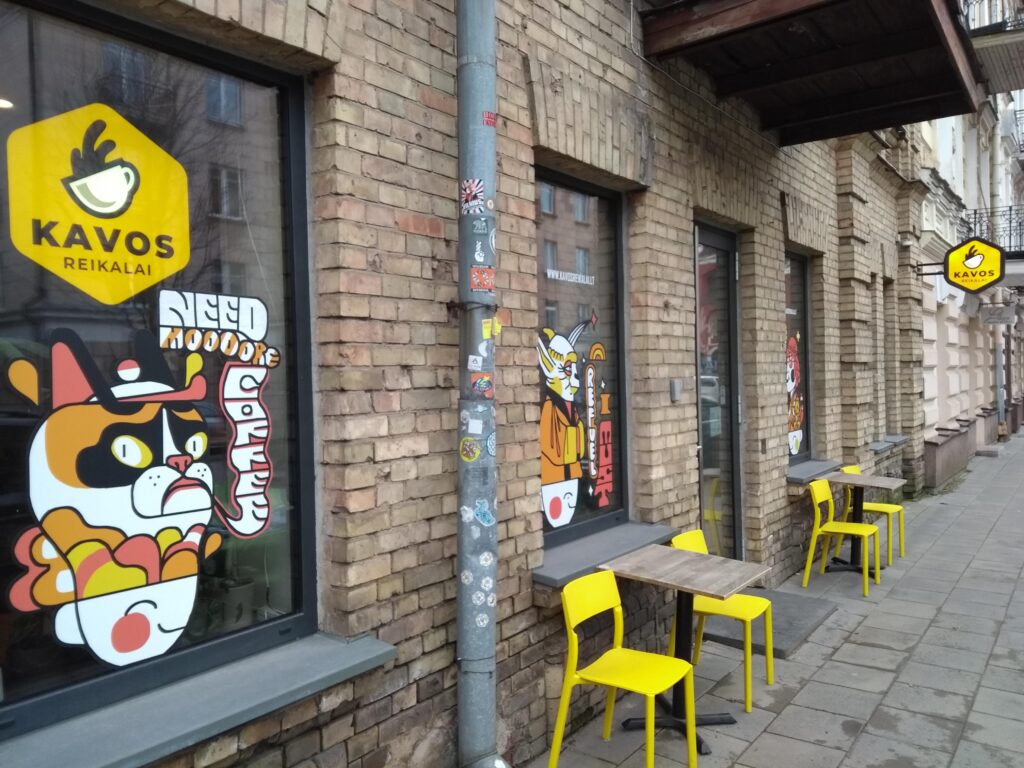
Am nächsten Tag fragt der Professor in „Love, Sex and Marriage“, ob jemand überlege abzureisen. Außer mir meldet sich niemand. Der Professor sagt: „Zu 99 Prozent wird hier nichts passieren.“
Ich genieße den Kurs, will ihn weiter besuchen. In der Un(i)sicherheit erkenne ich seinen Wert.
Auch der nächste Professor in „Cognitive Science of Religion“ sagt: „Macht euch keine Sorgen, ihr seid in Litauen sicher.“
Der Krieg fühlt sich nah an, nicht nur geographisch, sondern emotional. Ich kenne jemanden, der jemanden kennt, der mindestens eine der letzten Nächte im Bunker verbracht hat. Letztes Semester habe ich neben einer Ukrainerin gewohnt, mit ihr das Bad geteilt, sie hat mich ukrainisches Essen probieren lassen. Ich frage mich, was jetzt in ihrem Heimatland mit ihr ist. Eine Freundin aus der Slowakei hat mir ein Video geschickt, das einen Neunzehnjährigen singend Gitarre spielen zeigt, er habe letztes Semester in unserem Wohnheim gewohnt und empfange jetzt, zurück in der Ukraine, keine Nachrichten mehr.
/
The next day, the professor in „Love, Sex and Marriage“ asks if anyone is thinking of leaving. Apart from me, no one answers. The professor says, „99 per cent nothing will happen here.“
I enjoy the course, want to keep attending. I recognise its value in its insecurity.
The next professor in Cognitive Science of Religion also says, „Don’t worry, you are safe in Lithuania.“
The war feels close, not just geographically, but emotionally. I know someone who knows someone who spent at least one of the last nights in the bunker. Last semester I lived next door to a Ukrainian woman, shared a bathroom with her, she let me taste Ukrainian food. I wonder what’s wrong with her now in her home country. A friend from Slovakia sent me a video of a nineteen-year-old singing and playing the guitar. He lived in our dormitory last semester and now, back in Ukraine, he no longer receives any messages.
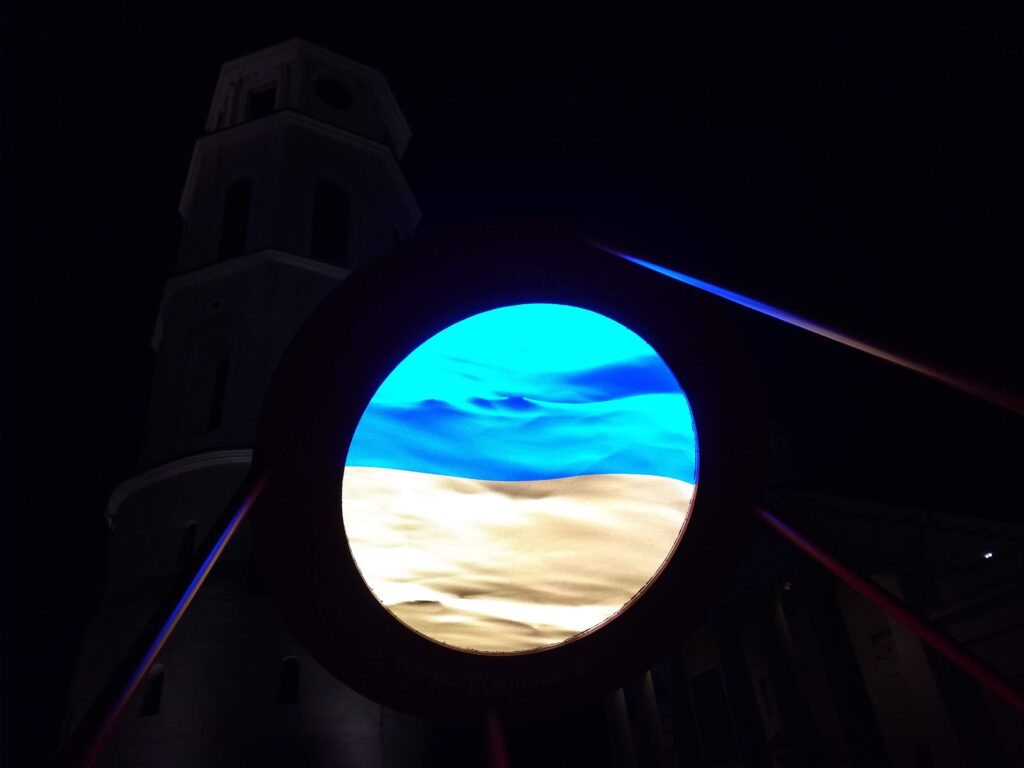
Bis zu dreimal täglich bekomme ich von jemandem aus Deutschland den Rat, zurückzukommen. Ich frage Georgia: „Bin ich wirklich die Einzige hier, die erwägt, zurückzureisen?“
Und sie sagt: „Ja.“
Sie macht sich mehr Sorgen um Georgien als um Litauen.
Ich frage eine andere Deutsche: „Raten dir auch Leute, dass du zurück nach Deutschland kommen sollst?“
Und sie sagt: „Nein.“
Am Samstag nehme ich an einem Erasmustrip nach Rumšiškės zum Užgavėnės Festival teil. Užgavėnės ist der Faschingsdienstag, das Fest entspricht Karneval, wird aber anders gefeiert als in Deutschland. Im Zentrum steht die Idee, dass der Winter vom Frühling vertrieben werden soll.
/
Up to three times a day I get advice from someone in Germany to come back. I ask Georgia, „Am I really the only one here who is considering going back?“
And she says, „Yes.“
She is more worried about Georgia than Lithuania.
I ask another German, „Do people also advise you to come back to Germany?“
And she says, „No.“
On Saturday I am taking part in an Erasmus trip to Rumšiškės for the Užgavėnės festival. Užgavėnės is Shrove Tuesday, the festival is equivalent to carnival but celebrated differently than in Germany. At the centre is the idea that winter should be driven away by spring.

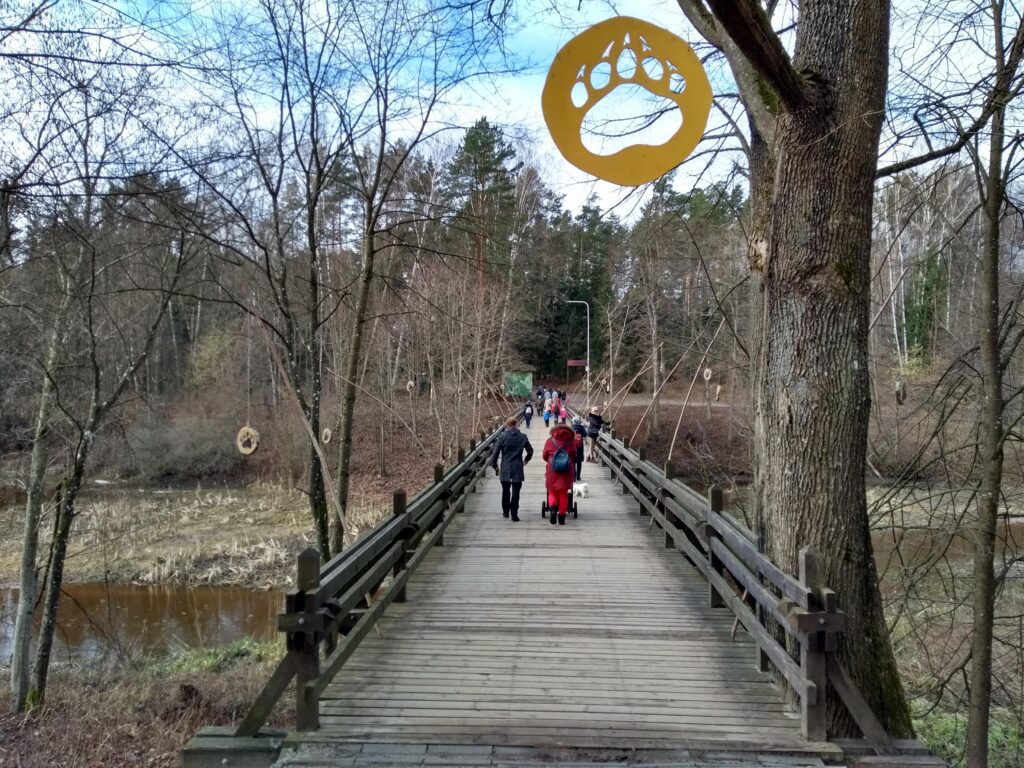
Das Festivalgelände liegt an einem großen See. Es erstreckt sich über ein Freilichtmuseum, das zeigt, wie die Menschen in Litauen früher gelebt haben. Für jedes der vier Gebiete Litauens (in denen übrigens verschiedene Dialekte gesprochen werden) gibt es eine Siedlung. Zahlreiche Stände verkaufen Lollis in Pizzaform, Masken, Streetfood und litauische Spezialitäten.
/
The festival site is located on a large lake. It extends over an open-air museum that shows how people in Lithuania used to live. There is a settlement for each of the four regions of Lithuania (where different dialects are spoken, by the way). Numerous stalls sell lollipops in the shape of pizzas, masks, street food and Lithuanian specialities.
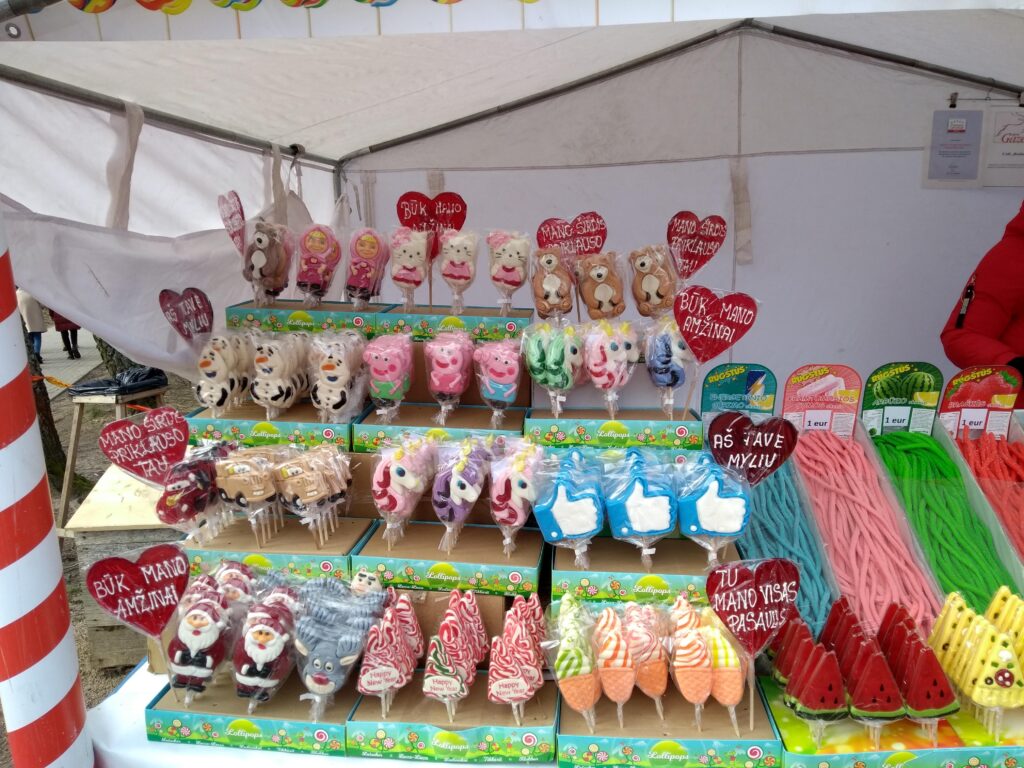
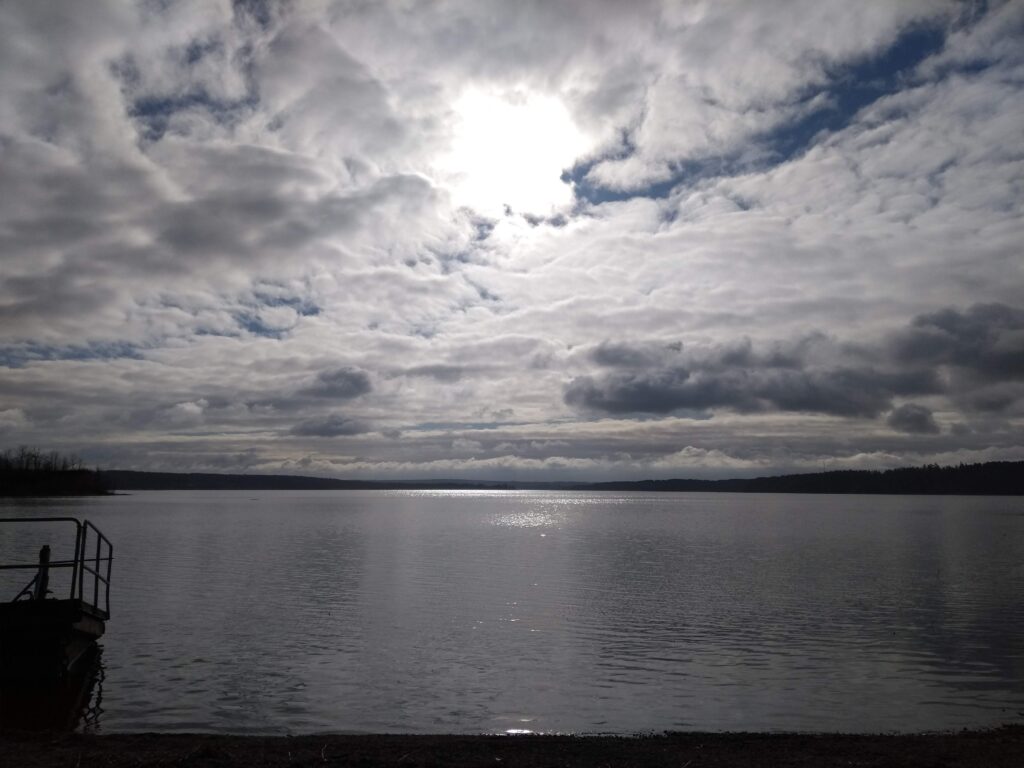
Manche Personen tragen eine Kette aus trockenen Minibagels um den Hals, die ich schon im Supermarkt gesehen habe. Ich habe sie probiert, die klassischen schmecken leicht süßlich und ein wenig nach Vanille. An einer Mühle brate ich mir in einer der aufgestellten Riesenbratpfannen selbst einen Pfannkuchen, er soll die Sonne symbolisieren, trieft vor Fett, kostet aber nichts. Ein schönes, gemeinschaftliches Ritual.
/
Some people wear a necklace of dry mini bagels around their necks, which I have seen in the supermarket. I have tried them, the classic ones taste slightly sweet and a little like vanilla. At a mill, I fry myself a pancake in one of the giant frying pans set up; it is supposed to symbolise the sun, is dripping with fat, but costs nothing. A nice, communal ritual.
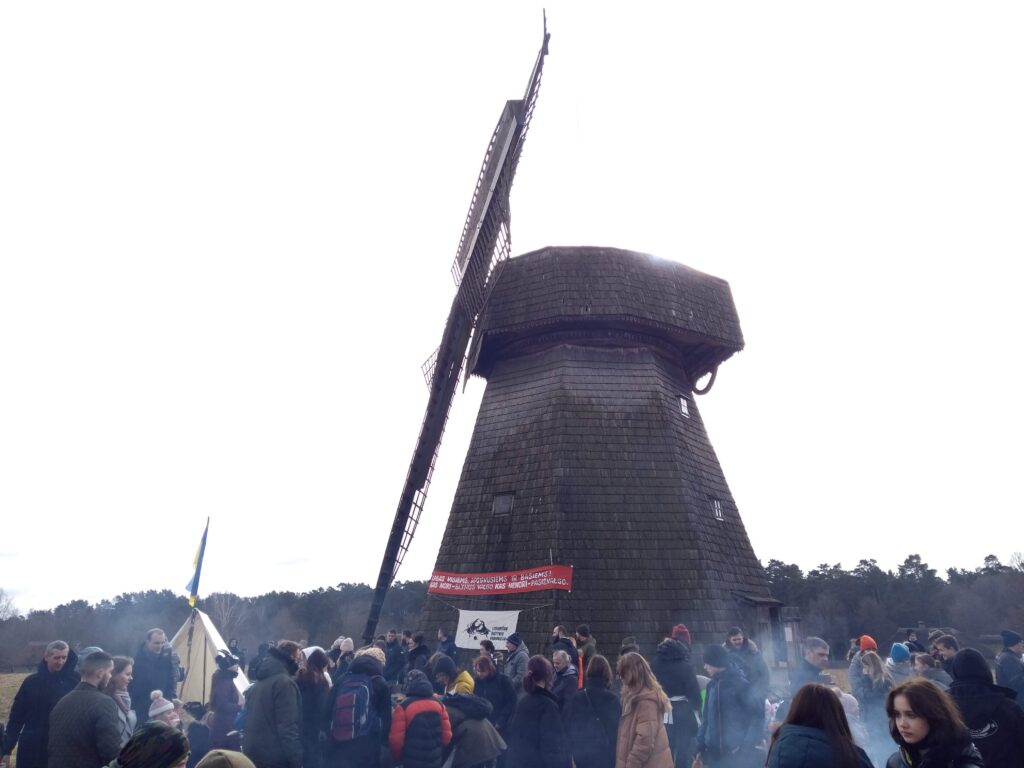
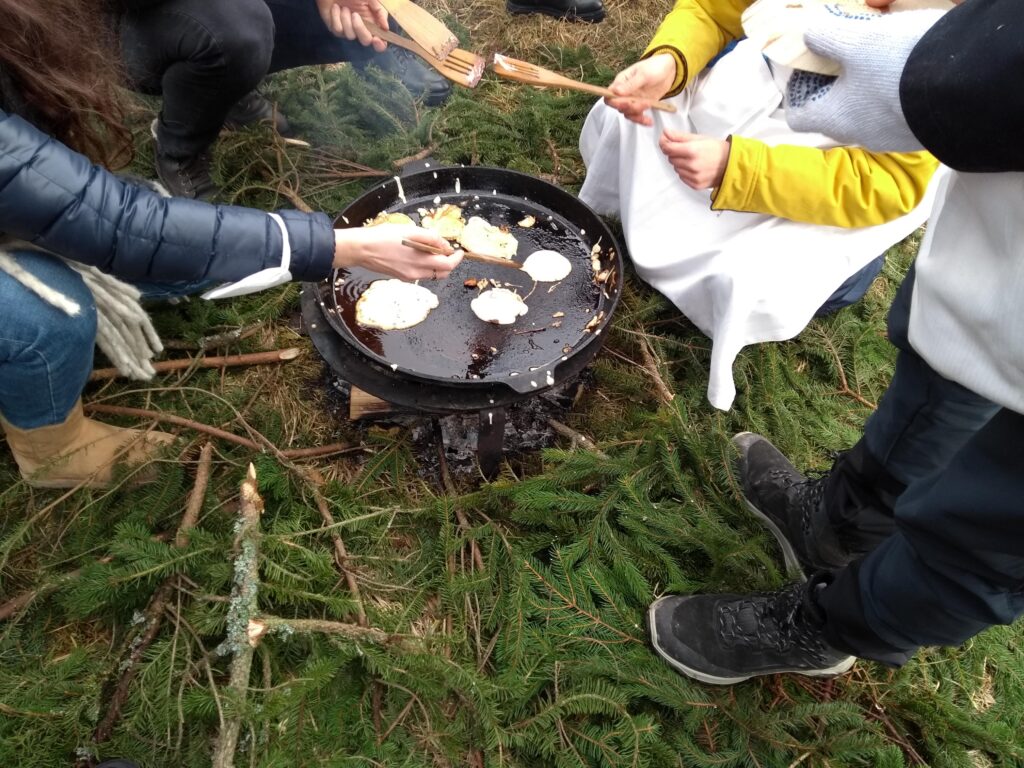
Es wird auf Litauisch getanzt und gesungen. Maskierte Menschen laufen rasselnd im Kreis, um dem Winter Angst einzujagen.
/
There is dancing and singing in Lithuanian. Masked people run rattling in circles to scare the winter.
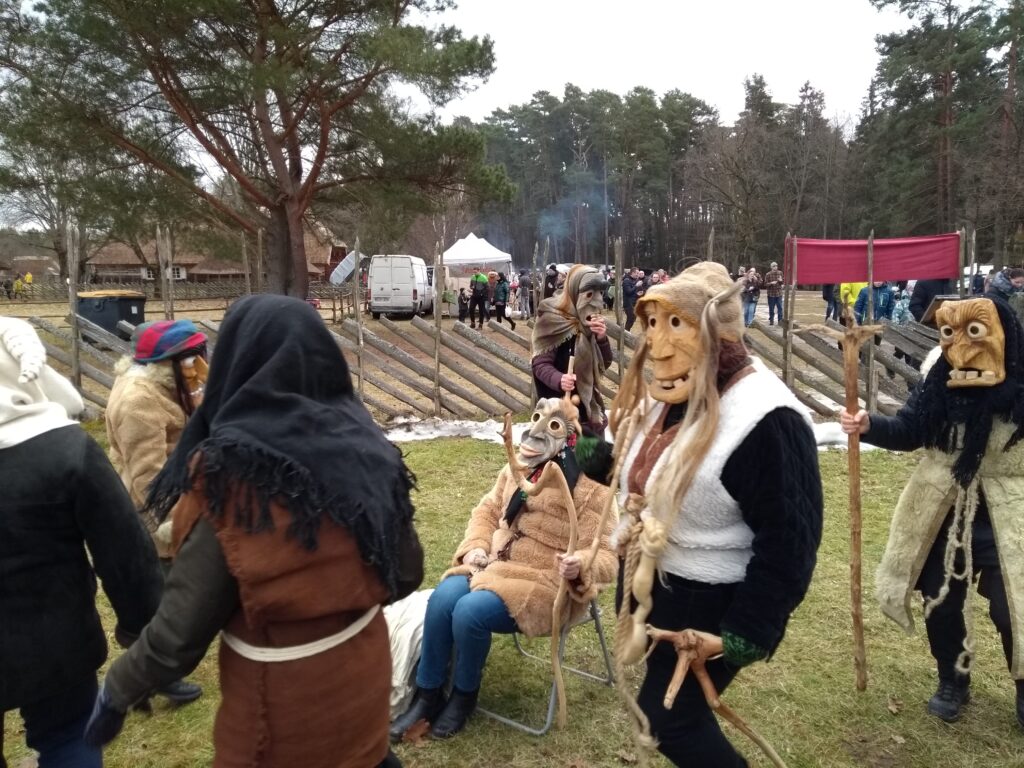
Auf Holzklötzen kämpfen jeweils zwei Männer oder Kinder – Winter und Frühling – mit Säcken gegeneinander.
/
On wooden blocks, two men or children – winter and spring – fight against each other with sacks.
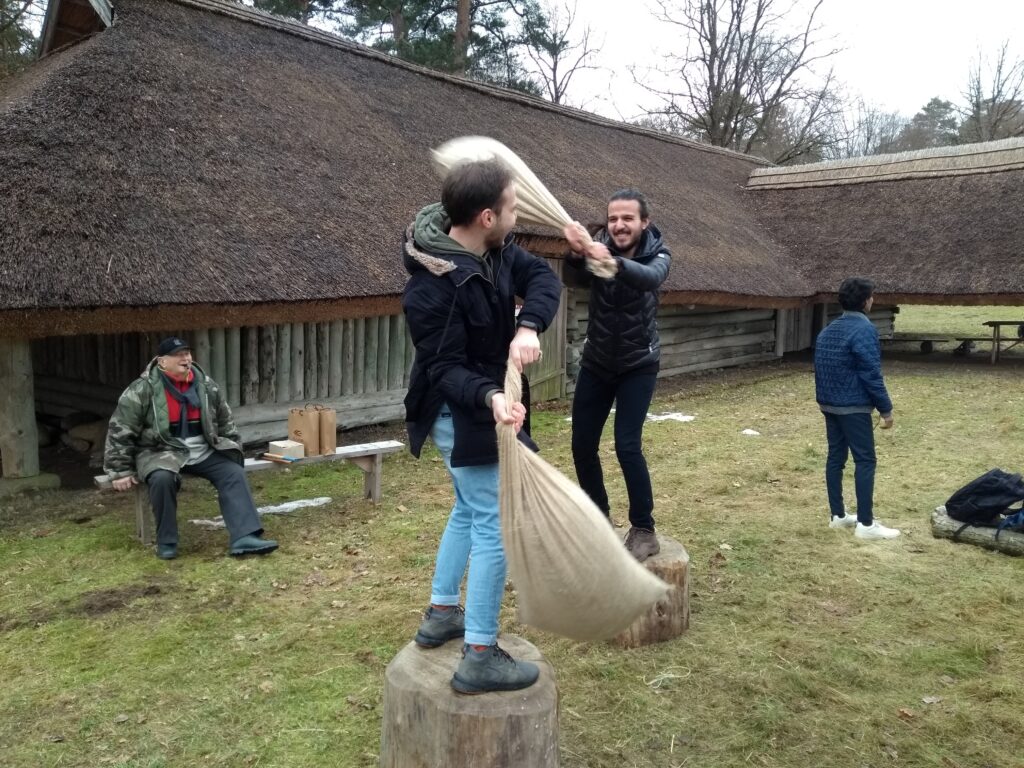
Auf einer Bühne werden eine Stunde lang Masken präsentiert und gekürt. Zum Schluss wird eine riesige Strohpuppe verbrannt, ein paar Meter weiter hängt eine ukrainische Flagge.
/
Masks are presented and crowned on a stage for an hour. At the end, a huge straw doll is burnt and a Ukrainian flag hangs a few metres away.

Wir besteigen einen Aussichtsturm, danach geht es zurück.
/
We climb a lookout tower, then head back.
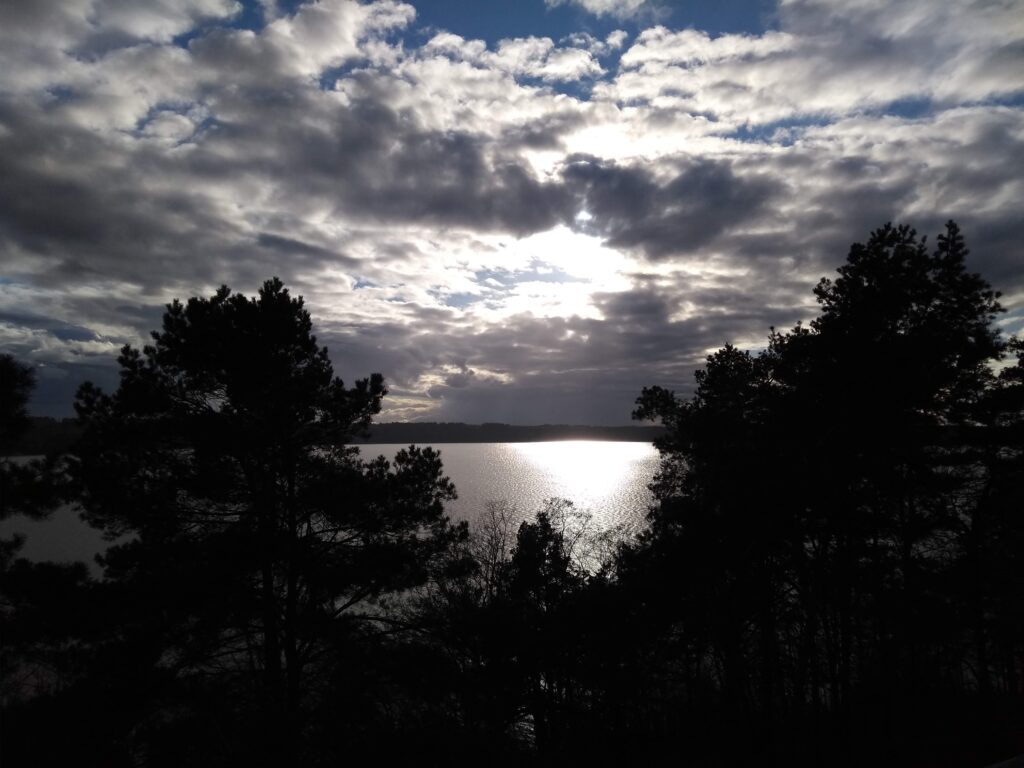
Am Sonntag schaue ich morgens erstmals nicht nach Flügen. Die Litauerin, die mit mir den Kurs „Love, Sex and Marriage“ besucht, hat mich gefragt, ob ich zur Ablenkung mit ihr ins MO Museum gehen wolle. Das Museum zeigt moderne Kunst und steht oben auf meiner Liste der Orte in Vilnius, wo ich noch nicht war, aber unbedingt hinwill. Wir treffen uns nach dem Mittagessen. Als Eintrittskarten bekommen wir einen gelben und einen blauen Sticker.
/
On Sunday morning, for the first time, I don’t look for flights. The Lithuanian woman who is taking the course „Love, Sex and Marriage“ with me asked me if I wanted to go to the MO Museum with her as a distraction. The museum shows modern art and is at the top of my list of places in Vilnius I haven’t been to yet, but definitely want to go. We meet after lunch. We get a yellow and a blue sticker as entrance tickets.
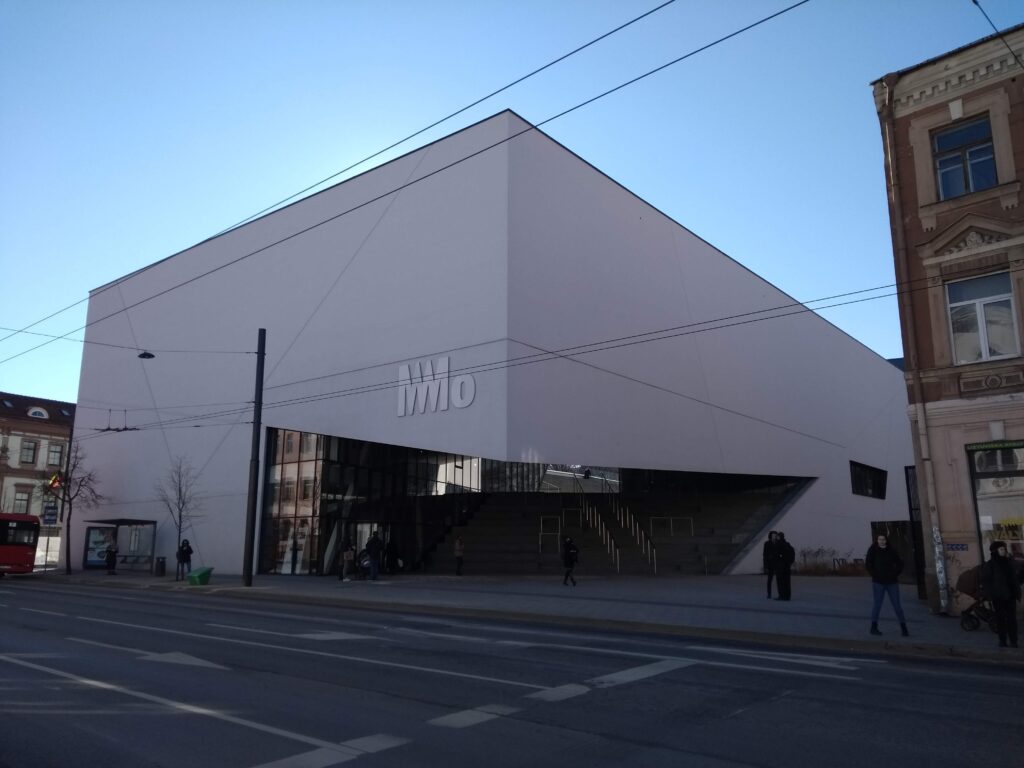
Momentan befindet sich eine Fotoausstellung im MO Museum, die litauische Feste zeigt, traditionelle und Partys, Menschen beim Feiern. Die Ausstellung beginnt mit Schwarzweißfotos von Beerdigungen und Toten in Särgen, schweift über Hochzeiten, Mädchen mit Bibeln wie Smartphones und Sportfeste marschierender Gleichheit und endet bei isolierten Rebellen im Heute.
/
At the moment there is a photo exhibition at the MO Museum showing Lithuanian festivals, traditional and parties, people celebrating. The exhibition starts with black and white photos of funerals and the dead in coffins, moves on to weddings, girls with bibles like smartphones and sports festivals of marching equality, and ends with isolated rebels in the present.
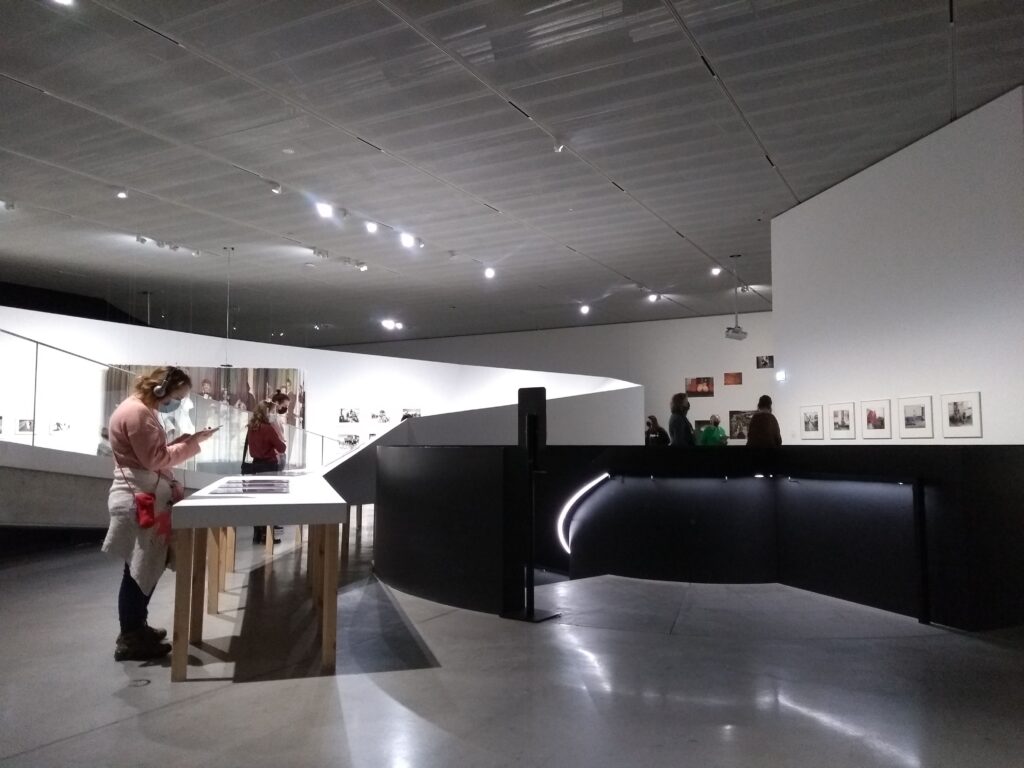
Am Ausgang kleben wir unsere Eintrittskartensticker zu den anderen – Gelb und Blau dominieren bereits.
/
At the exit we stick our ticket stickers to the others – yellow and blue already dominate.
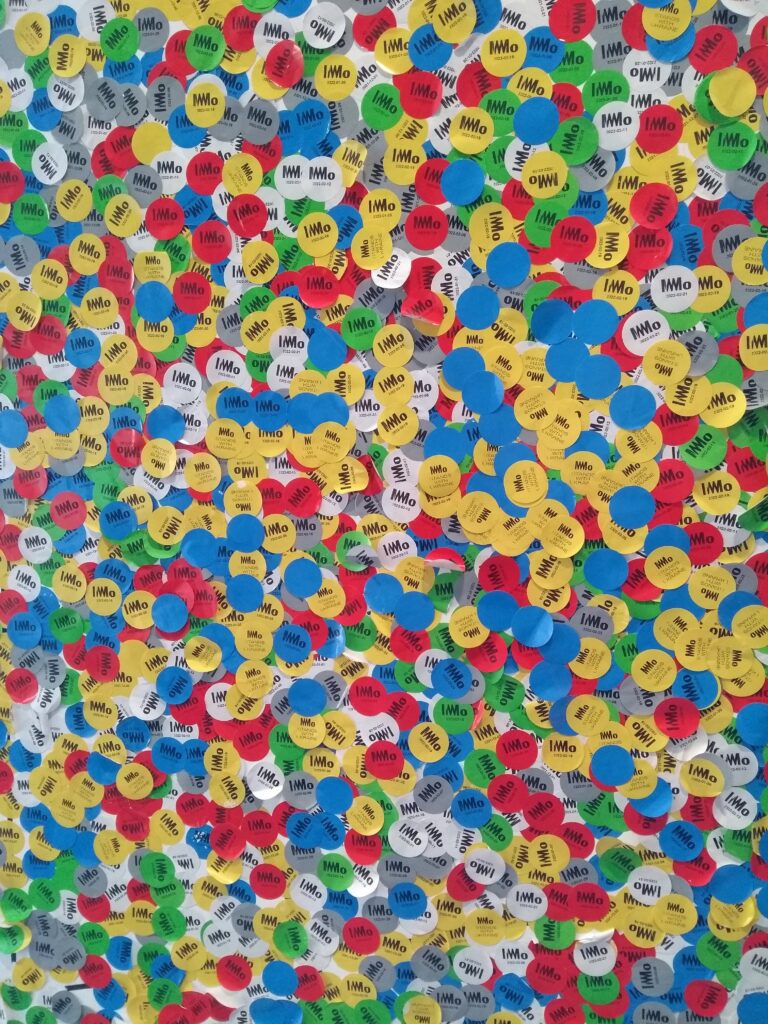
Draußen kosten wir die Sonne aus und machen einen Spaziergang durch die Altstadt, an der Vilnele entlang und durch das moderne Paupys, über das die Litauerin ihre Bachelorarbeit schreibt. In Paupys hat jedes Haus eine Geschichte, Personen können dort ihr Zuhause entsprechend ihrer Persönlichkeit wählen. Offenbar soll das Viertel den Drang nach Individualität, Freiheit und Privatsphäre befriedigen, aber meinen Geschmack trifft es nicht.
/
Outside, we savour the sun and take a walk through the old town, along the Vilnele and through modern Paupys, about which the Lithuanian is writing her bachelor’s thesis. In Paupys, every house has a story, people can choose their home according to their personality. Apparently, the district is meant to satisfy the urge for individuality, freedom and privacy, but it doesn’t suit my taste.
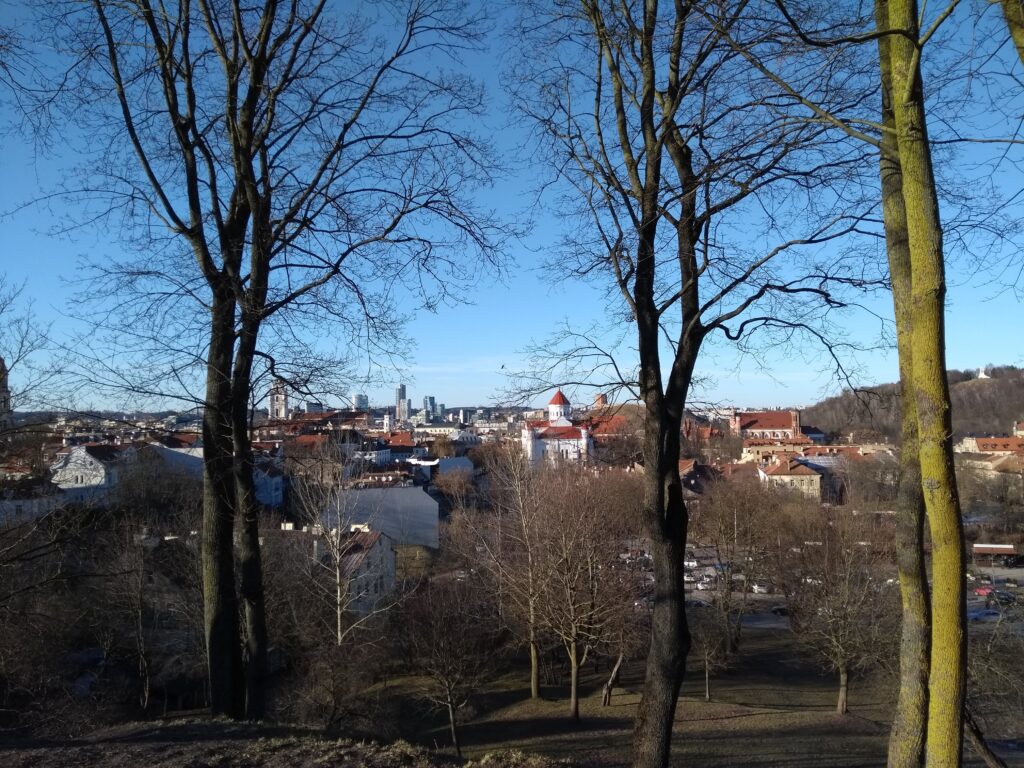

Auf der anderen Flussseite lassen wir uns auf einer Bank die Sonne auf die Nase scheinen und träumen vom Süden. Die Litauerin will nicht in Litauen bleiben, sondern nach Südfrankreich gehen. Ich selbst denke an einen Sprachkurs, vielleicht in Barcelona, Porto …
/
On the other side of the river, we let the sun shine on our noses on a bench and dream of the south. The Lithuanian doesn’t want to stay in Lithuania, but go to the south of France. I myself am thinking of a language course, perhaps in Barcelona, Porto …

Wenig später sehe ich gleich den zweiten Ort auf meiner Liste – Literatų gatvė, die Literatenstraße. Ein offenes Kunstmuseum voller Zitate und Weisheiten, die meisten auf Litauisch, die Litauerin kann sie mir übersetzen.
/
A little later I see the second place on my list – Literatų gatvė, the Literati Street. An open art museum full of quotes and wisdom, most of them in Lithuanian, the Lithuanian girl can translate them for me.

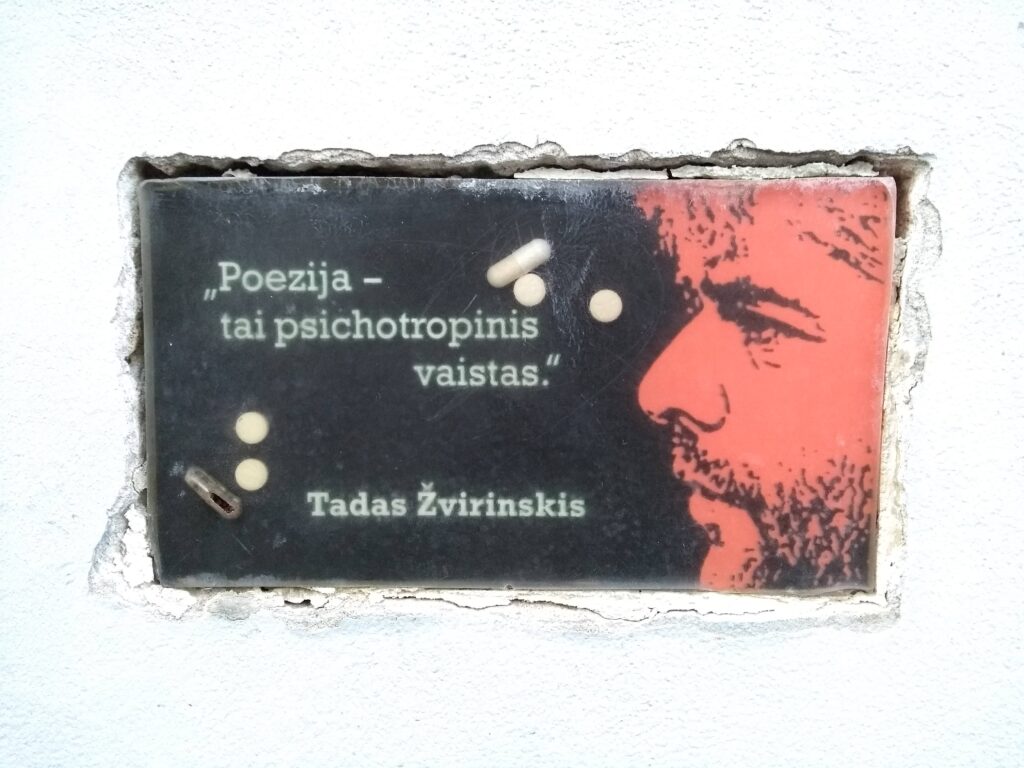
Ein paar Straßen weiter strömt mir der Geruch nach Waffeln in die Nase, ich kann wieder riechen.
Abends findet im Wohnheim ein Spieleabend statt. Es gibt Minibagels zu knabbern, eine Sorte, die nach Salzstangen schmeckt. Ich schlage vor, demokratisch abzustimmen, welches Kartenspiel wir spielen. Ein Mädchen aus Singapur sagt, sie wünsche sich einen Diktator, der für sie entscheide. Es erinnert mich an die Ansicht einer russischen Freundin, dass manche Völker in einer Diktatur aufgrund einer Neigung zur Abhängigkeit glücklicher seien. Mir macht es Angst, dass ein Einzelner die Macht hat, die ganze Welt in die Luft zu jagen, nicht weil er so mächtig geboren wurde, sondern weil soziale Konstrukte es ihm ermöglichen.
Die Slowakin in der Runde macht den DJ. Ein Lied gefällt mir besonders gut: Mám t‘a rád von Karol Duchon. Es heißt übersetzt: Ich mag dich. Ich mag sie, die Slowakin, das Mädchen aus Singapur, die Französin, die drei Georgierinnen und die andere Deutsche. Wieder fühle ich das große Glück, hier zu sein, die Bereicherung, Menschen aus der ganzen Welt kennenzulernen und zu erkennen, wie ähnlich wir uns bei allen kulturellen Unterschieden sind.
Als ich mich nach einer Runde Wizzard und vier Runden georgischem Uno verabschiede, verrät mir das Mädchen aus Singapur etwas, das mich riesig freut: Sie liest meinen Blog! Schon lange. Sie ist schon in Singapur auf ihn gestoßen und hat mich erkannt! Und jetzt wohnt sie im Zimmer neben mir. Was für ein Zufall! Verrückt!
Wieder in unserem Zimmer, weist Georgia mich darauf hin, dass das slowakische Lied Mám t‘a rád ein Cover von Red Light Spells Danger von Billy Ocean ist. Vor ein paar Tagen habe ich endlich die Musikkomödie „INSIDE“ von Bo Burnham gesehen – auch das Lied That Funny Feeling spricht mir in manchen Momenten aus der Seele. Aber sollte die Welt demnächst untergehen, will ich meine Zeit nicht zu Hause auf dem Sofa fristen (auch wenn ich dieses gemütliche Sofa oft vermisse). Ich will sie auf dieser Reise genießen, mit dem Gefühl, das mich überkommt, wenn ich die ersten Verse von Red Light Spells Danger höre.
Red light spells danger
Can‘t hold out much longer
‘Cause red light means warning
Can’t hold out I’m burning
/
A few streets away, the smell of waffles wafts into my nose, I can smell again.
In the evening, there is a games evening in the dormitory. There are mini-bagels to nibble on, a variety that tastes like pretzel sticks. I suggest a democratic vote on which card game to play. A girl from Singapore says she wants a dictator to decide for her. It reminds me of a Russian friend’s view that some peoples are happier in a dictatorship because of a tendency towards dependency. It scares me that one person has the power to blow up the whole world, not because he was born so powerful, but because social constructs make it possible for him.
The Slovakian in the round is doing the DJ. I particularly like one song: Mám t’a rád by Karol Duchon. It translates as: I like you. I like them, the Slovakian, the girl from Singapore, the French girl, the three Georgians and the other German. Again I feel the great happiness of being here, the enrichment of meeting people from all over the world and realising how similar we are despite all the cultural differences.
When I say goodbye after a round of Wizzard and four rounds of Georgian Uno, the girl from Singapore tells me something that makes me very happy: she reads my blog! For a long time now. She came across it in Singapore and recognised me! And now she lives in the room next to me. What a coincidence! Crazy!
Back in our room, Georgia points out to me that the Slovak song Mám t’a rád is a cover of Red Light Spells Danger by Billy Ocean. A few days ago I finally saw the musical comedy „INSIDE“ by Bo Burnham – the song That Funny Feeling also speaks to me from the soul in some moments. But if the world is about to end, I don’t want to spend my time at home on the sofa (even if I often miss that cosy sofa). I want to enjoy it on this journey, with the feeling that comes over me when I hear the first verses of Red Light Spells Danger.
Red light spells danger
Can’t hold out much longer
‚Cause red light means warning
Can’t hold out I’m burning
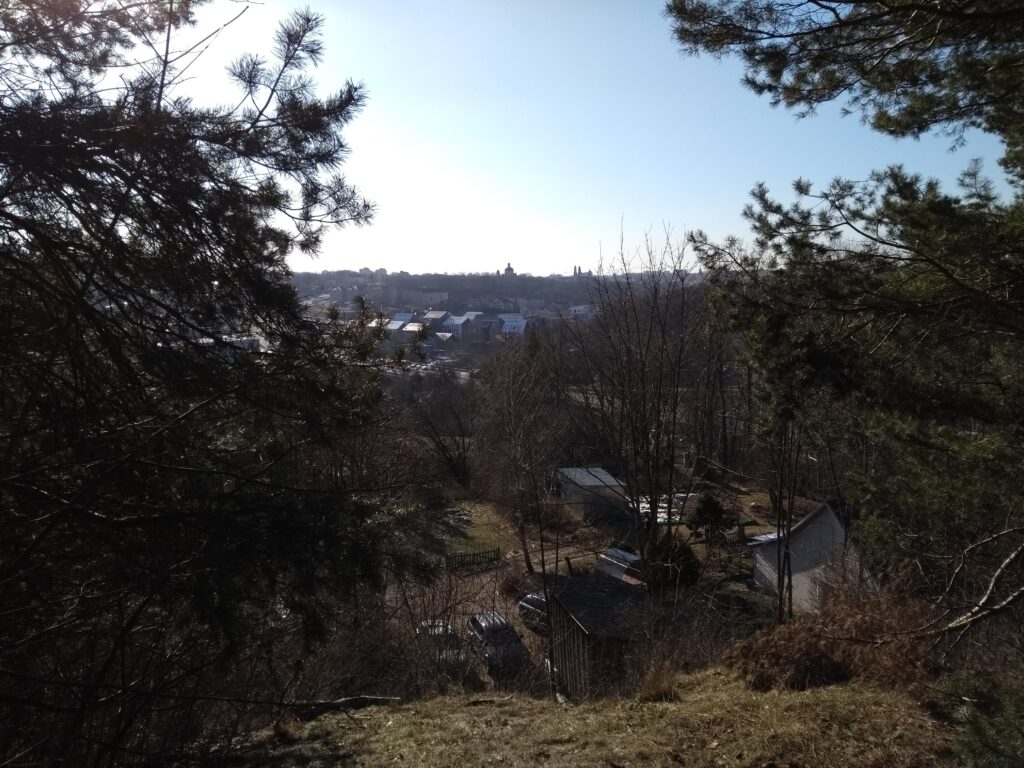

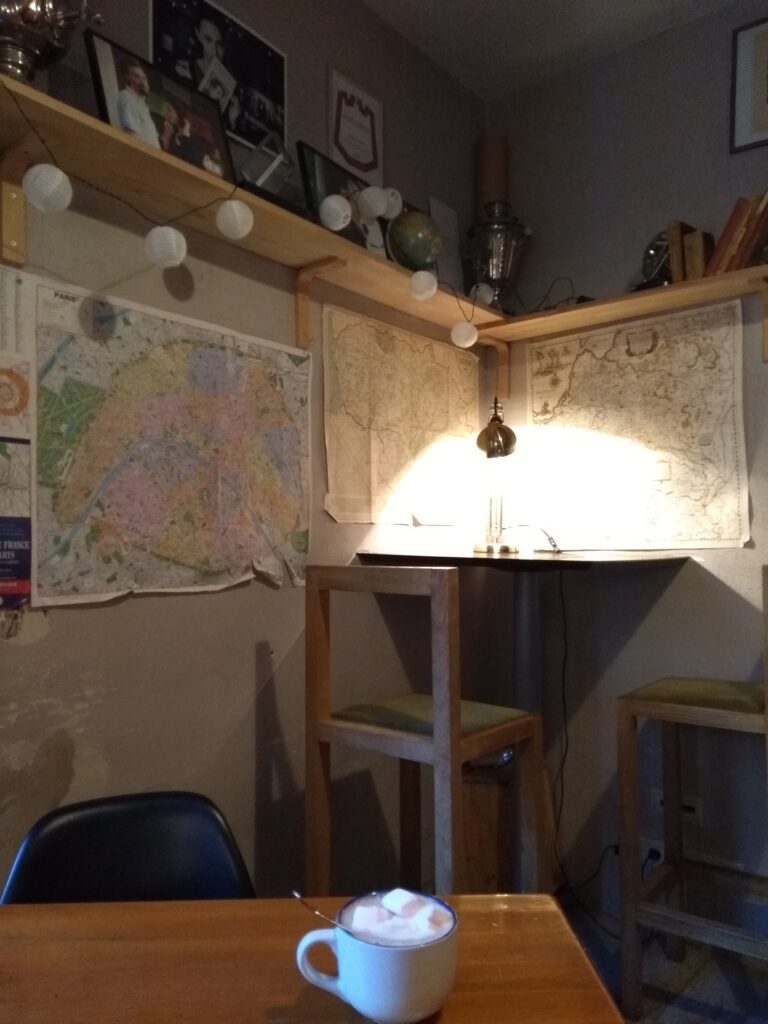


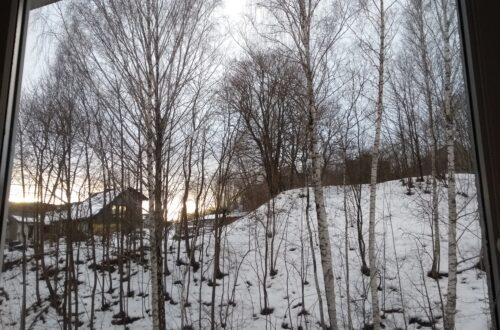
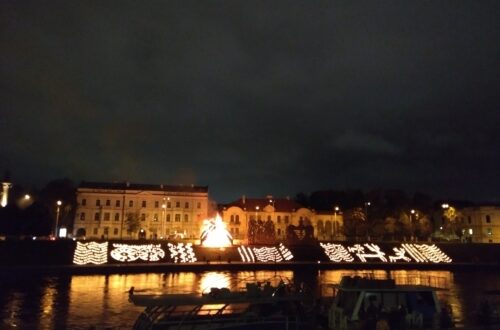
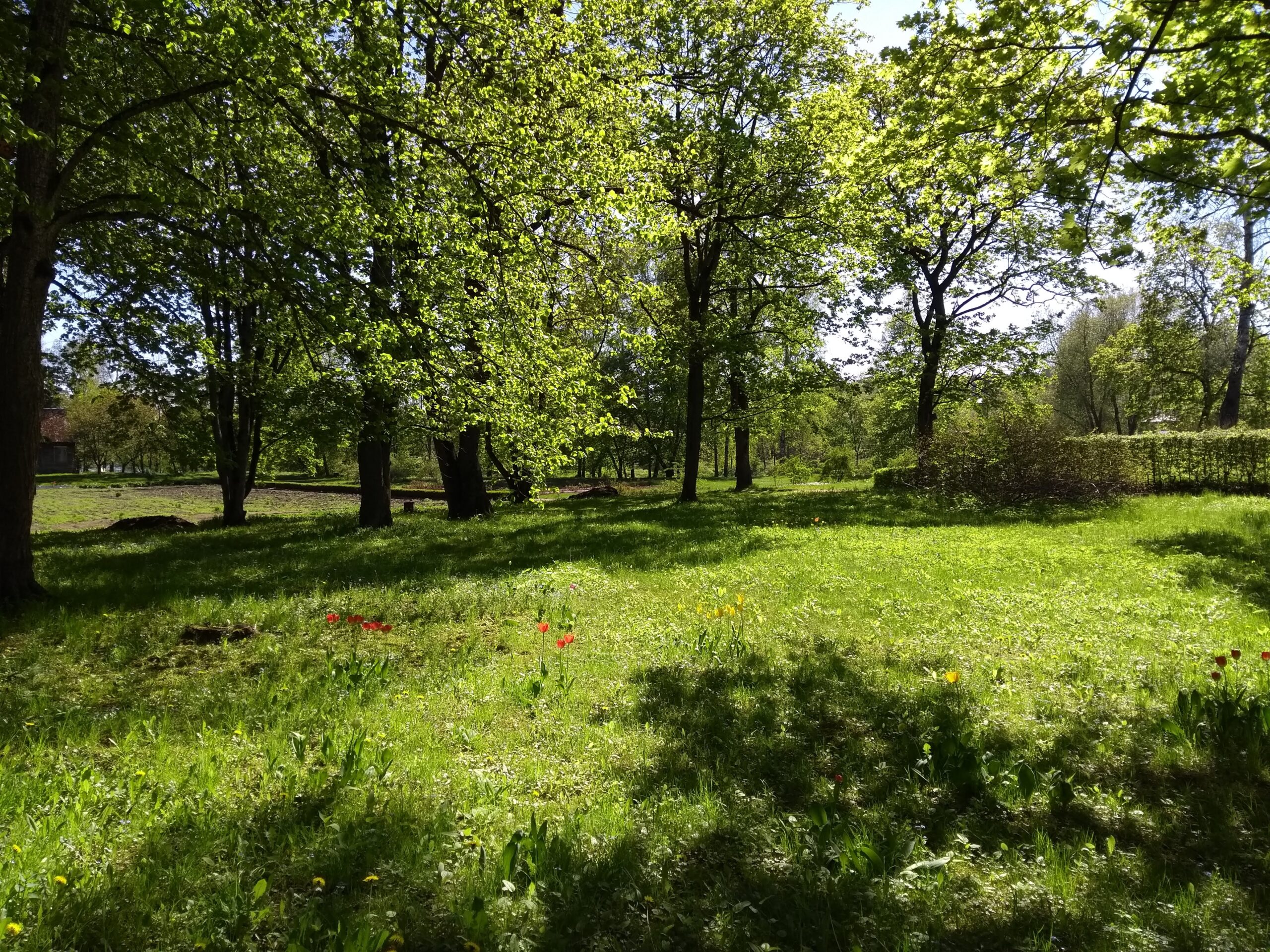
2 Kommentare
P S
Sehr schön beschrieben… Gerade in der jetzigen Lage finde ich es sehr schön, dass Du die Erfahrung machst, dass alle Menschen gleich sind, egal woher sie kommen…
Norbert
Immer wieder sehr interessante Einblicke, danke dafür….